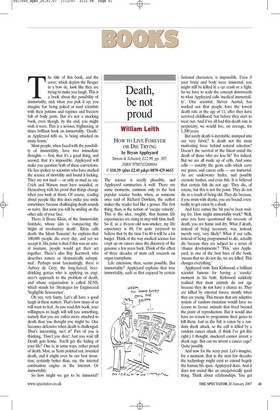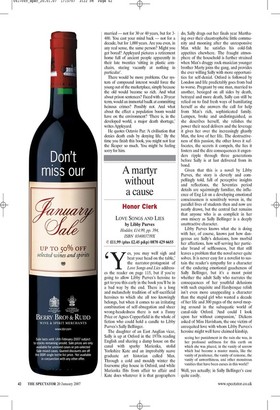Death, be not proud
William Leith How TO LIVE FOREVER OR DIE TRYING by Bryan Appleyard Simon & Schuster, £12.99, pp. 307, ISBN 9780743268684 £1039 (plus £2.45 p&p) 0870 429 6655 The title of this book, and the cover, which depicts the Reaper in a bow tie, look like they are trying to make you laugh. This is a book about the possibility of immortality, and, when you pick it up, you imagine fun being poked at mad scientists with their potions and regimes and freezers full of body parts. But it's not a mocking book, even though, by the end, you might wish it were. This is a serious, frightening, at times brilliant book on immortality. 'Death,' as Appleyard tells us, 'is being attacked on many fronts.'
Most people, when faced with the possibility of immortality, have two immediate thoughts — first, that it's a good thing, and second, that it's impossible. Appleyard will make you question both of these convictions. He has spoken to scientists who have studied the science of mortality and found it lacking. They are not mad — or only as mad as, say, Crick and Watson must have sounded, or Heisenberg with his proof that things change when you look at them. Of course, reading about people like this does make you smile sometimes, because challenging death sounds so naive. But soon you will be smiling on the other side of your face.
There is Bruce Klein, of the Immortality Institute, whose aim is 'conquering the blight of involuntary death'. Klein calls death `the Silent Tsunami'; he explains that 100,000 people die every day, and yet we accept it. His point is that if this was an actual tsunami, people would get their act together. There's also Ray Kurzweil, who describes nature as 'dramatically suboptimal'. Perhaps most fascinatingly, there is Aubrey de Grey, the long-haired, beerdrinking genius who is applying an engineer's approach to the problem of death, and whose organisation is called SENS, which stands for 'Strategies for Engineered Negligible Senescence'.
Oh yes, very funny. Let's all have a good laugh at these nutters. That's how many of us will want to feel. As you read this book, your willingness to laugh will tell you something, namely that you are rather more attached to death than you thought you might be. One becomes defensive when death is challenged. That's interesting, isn't it? Part of you is thinking, 'Don't you dare! Just you wait till Death gets home. You'll get the hiding of your life!' One is, in some ways, rather proud of death. Man, as Yeats pointed out, invented death, and it might even be our best invention; certainly better than, say, the internal combustion engine or the internet. Or immortality.
So how might we get to be immortal?
The science is scarily plausible, and Appleyard summarises it well. There are some moments, common only to the best popular science books, when, as someone once said of Richard Dawkins, the author makes the reader feel like a genius. The first thing, then, is the notion of 'escape velocity'. This is the idea, roughly, that human life expectancies are rising in step with time itself. So if as a 46-year-old non-smoker, my life expectancy is 80, I'm quite prepared to believe that by the time I'm 80 it will be a lot longer Think of the way medical science has crept up on cancer since the discovery of the genome a few years back. Think of the effect of three decades of stem cell research on organ transplants.
Life extension, then, seems possible. But immortality? Appleyard explains that true immortality, such as that enjoyed by certain fictional characters, is impossible. Even if your brain and body were immortal, you might still be killed in a car crash or a fight. So we have to scale the concept downwards to what Appleyard calls 'medical immortality'. One scientist, Steven Austad, has worked out that people have the lowest death rate at the age of 11, after they have survived childhood, but before they start to wear out. And if we all had this death rate in perpetuity, we would live, on average, for 1,200 years.
But surely death is inevitable, stamped into our very fabric? Is death not the main motivating force behind natural selection? Doesn't the survival of the fittest entail the death of those who are less fit? Yes indeed. But we are all made up of cells. And some cells — notably the germ cells which carry our genes, and cancer cells — are immortal. As are underwater hydra, and possibly creosote bushes, and even fish. It is believed that certain fish do not age. They die, of course, but this is not the point. They do not die as a result of being old. They die because, if you swim with sharks, you are bound, eventually, to get eaten by a shark.
And here comes the bit you've been waiting for. How might immortality work? Well, once you have questioned the necessity of death, you are home and dry. What if death, instead of being necessary, was, instead, merely very, very likely? What if our cells, instead of being programmed to die, actually die because they are subject to a series of 'chance developments'? 'This,' says Appleyard, in one of the best lines of the book, 'means that we do not die, we are killed. This changes everything.'
Appleyard visits Tom Kirkwood, a brilliant scientist famous for having a 'eureka' moment in his bath. Kirkwood suddenly realised that most animals do not age because they do not have a chance to. They are killed by external forces, mostly when they are young. This means that any adaptive system of random mutation would have no reason to favour animals that lived beyond the point of reproduction. But it would also have no reason to programme their genes to kill them. Just as the fish is eaten by a random shark attack, so the cell is killed by a random cancer attack. (I think I've got this right.) I thought: mackerel cannot invent a shark cage. But can we invent a cancer cage? Quite possibly.
And now for the scary part. Let's imagine, for a moment, that in the next few decades the technology might exist to extend hugely the human life span. Appleyard does. And it does not sound like an unequivocally good thing. Think about relationships. You get married — not for 30 or 40 years, but for 3400. You cast your mind back — not for a decade, but for 1,000 years. Are you even, in any real sense, the same person? Might you get bored? Appleyard pictures a retirement home full of ancient people apparently in their late twenties 'sitting in plastic armchairs, staring vacantly at nothing in particular'.
There would be more problems. Our system of compound interest would force the young out of the marketplace, simply because the old would become so rich. And what about prison sentences? Faced with a 20-year term, would an immortal baulk at committing heinous crimes? Possibly not. And what about the effect a population boom would have on the environment? 'There is, in the developed world, a major death shortage,' writes Appleyard.
He quotes Octavio Paz: 'A civilisation that denies death ends by denying life.' By the time you finish this book, you might not fear the Reaper so much. You might be feeling sorry for him.






















































 Previous page
Previous page